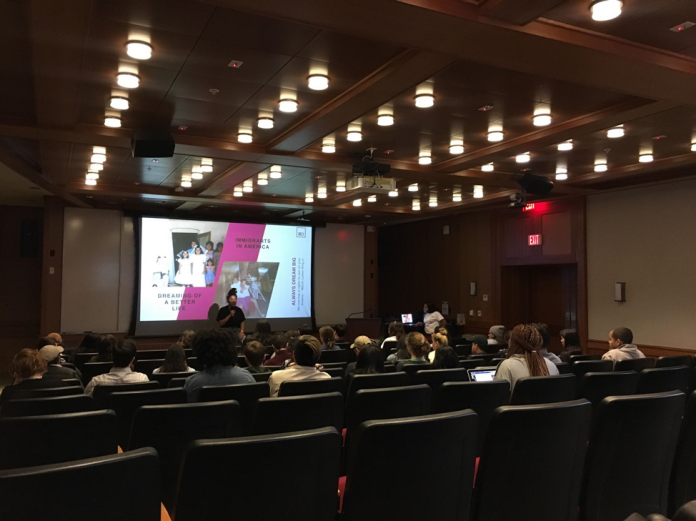Wednesday, Feb. 12, the Voter Engagement Committee hosted a lecture by Class of 1935 Professor John McGlennon, titled “Why are American politics so polarized, and will things ever change?” McGlennon shared his insights into the deepening divisions within American politics and potential paths forward to heal the partisan divide.
McGlennon has taught at the College since 1974, specializing in U.S. politics with a focus on the American South and Virginia. He spent a large part of the lecture identifying the nature of political polarization, tracing its historical roots and analyzing how it has evolved over the years.
“People [today] are affiliating with other people who are more like themselves than like the people who identify with the other political party,” McGlennon said.
He contrasted this present-day political situation with his prior experience in government.
“I was a candidate twice for the U.S. House of Representatives in the 1980s, and I can tell you at that time the nature of partisan polarization was very different. It was not a polarized political system,” he said.
In addition to contrasting his experience with the current landscape, McGlennon also drew parallels to other similar periods of polarization.
McGlennon takes a lot of comfort from the nation’s ability to get through this similar era of polarization. He holds an optimistic view about the nation’s ability to similarly move past our current one.
“The hopeful thing is that at some point things will become less polarized,” he said.
Many attendees appreciated McGlennon’s unique political insight and extensive historical knowledge.
“I definitely learned a lot,” Zoe Wang ’25 M.P.P. ’26 said. “I didn’t know that America had gone through this period of polarization at the turn of the 19th to the 20th century.”
“He is clearly well-versed,” Griffin Must ’25 M.P.P ’26 said, a student attendee of the event. “He did a really good job of using the past to explain the present.”
Jack Hunter ’26, another student in attendance, echoed these sentiments.
“It’s nice to talk to people who have been on the earth longer and have been through some more things to provide some perspective. Everything can feel just so much more urgent in the moment.”
This diversity of takeaways from the event was evident in the reflections shared by student attendees. For example, Wang expressed concern about the current state of division in American politics.
“People just don’t really see eye to eye anymore,” she said. “I think we need to do more to bring people together.”
Following the lecture, McGlennon opened the floor up for questions from the audience, which allowed attendees to raise areas of concern or doubt. This interactive segment underscored the event’s broader purpose of fostering civic engagement and dialogue.
The Voter Engagement Committee hosted the talk. The group consists of students, faculty and staff at the College who promote “the value of voting by providing information and hosting events year-round that encourage voter education, registration, and participation,” according to its website.
“People hear voter engagement, and they just think elections, voting. There’s so many other layers of participating,” Sam Houghton ’25, a member of the committee and organizer of the event, said.
Rich Thompson, associate director of Civic and Community Engagement and a staff member of the committee, also weighed in on the impact of McGlennon’s lecture.
“I feel that this program aligns with and supports the university’s Democracy Initiative as a cornerstone of the Vision 2026 Strategic Plan,” Thompson said. “As stated in the plan, we hope to ‘rediscover the ideals that make pluralistic democracies strong in a time of great division.’”
When asked what he hopes attendees will take away from the talk, Thompson hoped it spoke to the unique perspectives each student brought to the talk.
“I believe that it is possible that his program might inspire participants to learn more on the subject matter and have constructive dialogue,” Thompson said.
Thompson further underscored the importance of the Voter Engagement Committee’s efforts.
“Offering events such as this reaffirms that the heart of democracy is an ongoing practice beyond one’s ultimate expression of voting which is a yearly practice here in the Commonwealth of Virginia,” Thompson said. “Additionally, when students organize events such as this one, they practice civic leadership skills that quite often carry on beyond their time here at William and Mary.”
The talk offered a unique opportunity for students and faculty to explore the complex issue of political polarization and to reflect on how they, as future leaders, can contribute to building a more united political landscape.

